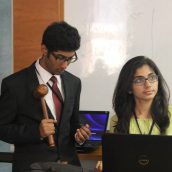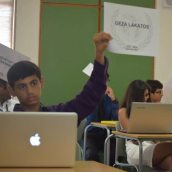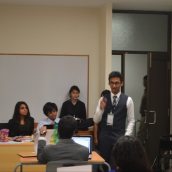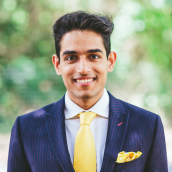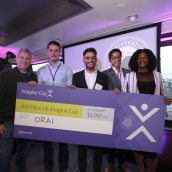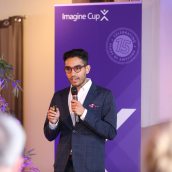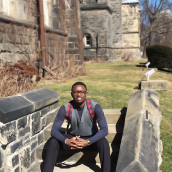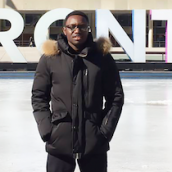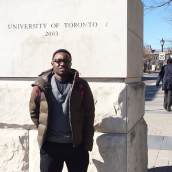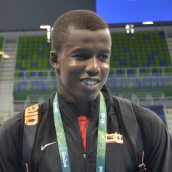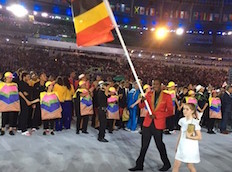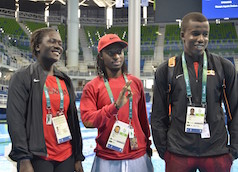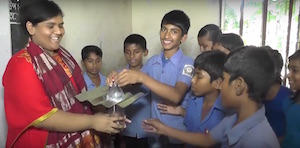Rising Beyond: Inspiring Debate at the MUN
The simulation opened with an aesthetic dance performance showcasing culture that exists in great depth, as well as having Birad Yajnik speaking about global citizenship and leadership. The opening ceremony was followed by the first session of this simulation which consisted of students prepared for heavy debate.
The first session was preliminary and introduced the agendas and topics of debate of each committee to all the delegates. DISEC (Disarmament and International Security Committee) was engaged in debating over the international intervention in Civil Wars; ECOSOC (Economic and Social Council) debated over the impact of science, innovation and technology in achieving the millennium development goals; the JCC (Joint Crisis Committee) went back into history and debated over issues concerning World War II; and lastly, we had the Press Corps which interacted with each committee and their delegates of the conference, and got intensely rooted in the simulation, in order to provide for a very holistic experience of the whole event that took place.The second day still carried on with the same passion and enthusiasm. The second session started off with a morning crisis update, which proved to be quite a surprise to all the delegates. However, the debates in each committee over the crisis initiated slowly, and later escalated into deeper and effective discussions. The Press were involved in initiating Crisis in each committee which proved to be operative as it provoked heavy debates and discussions, further on the day. The second day proved to be an ecstatic and progressive one as it stimulated every mind, which resulted in exciting preparations for resolutions for the last day. The Delegate Dance was of course one of the highlights of the second day of the simulation.
Eventually came the final day of the simulation. The day proved to be brief but tense as delegates of each committee had to come up with effective resolutions according to their agendas. Every committee except for JCC (as it was historical) and DISEC succeeded in coming up with resolutions. Although DISEC failed to pass a resolution, it still instilled the sense of intrigue, passion and enthusiasm to overcome problems that are faced on the surface of the planet – each day and every moment.After having come up with a variety of resolutions, the time for closing the simulation had come. This time was much awaited by the delegates as it was also an award ceremony. Titles such as “Best Delegate”, “Outstanding Delegate”, “Best Photographer” and “Best Reporter” echoed the halls of the venue wherein the ceremony took place. After having a hearing of speeches of inspiration and accomplishment by the Security General and the Executive Board, as well as teachers and staff who functioned as a backbone to the simulation; and watching proud delegates walking towards their much deserving awards, came the time of saying a proud goodbye to the Aga Khan Academy, Hyderabad’s second edition of the Model United Nations conference. Now awaits the third edition which shall happen in Fall, 2015.
By Akanksha Dev
Danish Dhamani (Class of 2013): Everything’s gonna be Orai
Critical thinker. Life-long learner. Global citizen. Three traits, fostered during his time at the Aga Khan Academy, that characterise Danish Dhamani as he now graduates from Drexel University with a BSc in Mechanical Engineering. A 2013 graduate from the Aga Khan Academy Mombasa, Danish was an integral part of the residential community and president of the Student Representative Council during his two years at the school.
When asked about his most cherished memories, Dhamani reminisced about the sense of community that developed as a result of the residential program. “People became really close to one another, like an extended family. We had meals together, we celebrated birthdays and special occasions together, and we studied together… One really memorable event for me was singing ‘Happy birthday and kata keki’ (‘cut the cake’ in Swahili).” Danish’s term serving as president of the Student Representative Council was similarly rooted in the idea of building a familial sense of community, and most of his events were geared towards achieving this goal.
Four years later, Danish continues to think outside the box and combine his personal interests with making a difference in the society. Upon arriving at university, he discovered that he needed to improve his public speaking skills. Danish realised that this is a problem that affects many people around the world.
His solution to this problem? Orai.
Orai is a mobile app that aims to make anyone become a better public speaker using artificial intelligence. From tracking the number of ‘ums’ and ‘you knows’, to assessing the “tone” of your speech, the app provides a comprehensive report and suggestions on how you could become a better presenter. The intelligent engineering of the algorithms and attention to detail in the app literally leaves no person speechless.
At present, his venture has won approximately $50,000 in prizes. Orai won 2nd place in the Microsoft US Imagine Cup Finals and advanced with 6 other ventures to the Imagine Cup World Finals in July 2017. Motivated to take his venture to the next level, along with his co-founder, Danish will be working full-time on Orai post-graduation. His efforts and dedication towards Orai has now impacted the lives of over 30,000 users around the world.
As he reflects on his time at the Academy, Danish specifically remembers his classes with Mr. Alchin. “He looked at the world very differently,” he notes. Teachers such as Mr. Alchin instilled in Danish the capacity and willingness to think outside the proverbial box. In preparing him for university, both the International Baccalaureate curriculum and the opportunity to engage in extracurricular activities broadened his perspective towards the world and made him a lifelong learner.
His vision for the future is to be able to reside in a world where individuals are exposed to the global issues such as food insecurity and global warming from a young age, and are equipped with knowledge on latest technological advancements to engage in problem solving and action driven initiatives.
By Karina Hussein
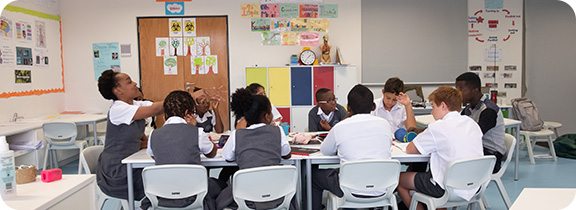
Financial Assistance
Admission to the Academy is based on merit. Students from all socio-economic backgrounds who satisfy the requirements for entry are encouraged to apply.
Partial to full financial aid is available to accepted students with a demonstrated need. Financial aid awards are reviewed annually and renewed only after reassessment of financial need.
For more information, and to access our financial aid application form, please see the following:
Please contact us for information about admission, scholarships and financial aid.
Kelvin Njue (Class of 2015): Changing lives through education
“I believe that with education, people have the power to tackle and solve problems that affect their communities,” reflects Kelvin Njue, a graduate from the Aga Khan Academy Mombasa.
Upon graduating from the Academy in 2015, Kelvin was unsure if he would be able to pursue higher education until he received an email about the Ontario Tuition Waiver Programme from his university counsellor at the Academy.
“I intended to go to university straight after high school, but I needed to take a gap year so that I could find the means to attend university.”
During his gap year after graduating, he found out about the waiver programme.
“I applied as I knew acquiring a university education would change my life and would open up many other opportunities. Without the tuition waiver programme, I was going to struggle to attend an institution of higher education. It gave me hope and is something that has allowed me to access quality education.”
During his gap year, Kelvin interned at the Diamond Trust Bank in Nairobi, assisting clients with their day-to-day banking needs and providing customers with banking solutions.
Kelvin is currently enrolled in the faculty of arts and science at the University of Toronto, aspiring to complete the financial economics (specialist) programme with a minor in employment relations. Kelvin shares his love for economics.
“I have always had an interest in economics and have wanted to study it since high school. I wanted to find a job during my gap year that would allow me to apply concepts in economics. I felt that working in the bank aligned with both my academic and career aspirations.”
In his first year of university, Kelvin was enrolled in economics, mathematics and sociology courses, of which sociology has been his favourite.
“I am really enjoying looking at social inequality and social institutions and how society functions. It ties into economics really well and how society works in different ways.”
When Kelvin is not studying, he spends his time playing intramural volleyball, playing drums with students from his dormitory and exploring Toronto. For Kelvin, one of the biggest adjustments he had to deal with in his move to Canada was the weather.
“I have been away from my family for many years attending school, so that wasn’t as difficult for me. The hardest thing for me was getting adjusted to the weather in Canada.”
Kelvin has embraced the cold winters in Canada, learning to ice skate this past winter. Kelvin is hoping to become more involved with extracurricular activities offered by the University of Toronto next year.
“For next year, I would like to join the Business Board on the University of Toronto governing council board. The opportunity allows members to manage different business activities that take place around the university and I am very interested in this. I also want to explore different sports next year and would like to join intramural teams.”
One of Kelvin’s passions that began to cultivate throughout his time at the Academy is ensuring that all people have access to a quality education.
“Because I have had so much support from the Academy and different programmes that helped to finance my own academics, I would also like to give this opportunity to other children to get the same quality of education that I have been able to acquire. I want to start up an organisation or programme that can offer financial support or scholarships for students so that they can also attend school and get an education.”
During his time at the Academy, Kelvin was able to visit a slum in Nairobi and worked with students from Grades 1 to 6 for a six-week period, partnering with the Aga Khan Foundation to distribute reading materials, books, pencils and bags to students living in the community. Kelvin attributes his passion for wanting to make a change in the world to his time at the Academy.
“I think the Academy was able to give me self-confidence and motivated me to believe that I am an agent of change in making the world a better place and that I should always take every opportunity to make a change, no matter how big or small it is."
By Karina Hussein
Joshua Tibatemwa (Class of 2015): From Mombasa to Rio 2016
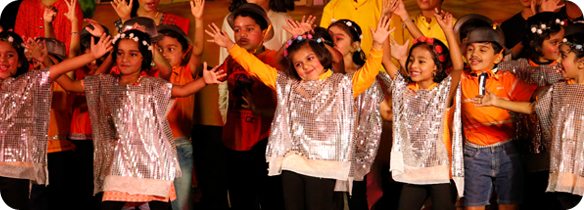
Primary Years Programme
The Junior School of the Aga Khan Academy Hyderabad is an International Baccalaureate World School and has been authorised for the Primary Years Programme (PYP).
Foundations for lifelong learning
We offer the PYP for students in grades 1–5 (aged 6–10). The programme focuses on the development of the whole child. It is geared towards creating independent, confident and respectful learners.
Our classroom curriculum addresses the children's social, physical, cultural and ethical development while giving them a strong foundation in all the major areas of knowledge.
The curriculum consists of five essential elements:
- concepts
- knowledge
- skills
- attitude
- action.
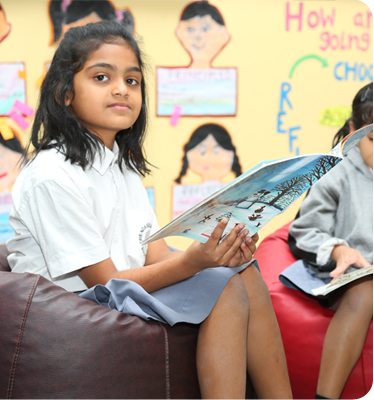 The core subjects we cover include English language, mathematics, social studies, science and technology. Our programme also includes a beginning computing course, physical education, music, art and Hindi.
The core subjects we cover include English language, mathematics, social studies, science and technology. Our programme also includes a beginning computing course, physical education, music, art and Hindi.
Students and teachers explore questions in all subject areas using an interactive, student-centred approach. The knowledge element of the curriculum is enhanced by six themes that are studied across the various subject disciplines. These are:
- who we are
- where we are in place and time
- how we express ourselves
- how the world works
- how we organise ourselves
- sharing the planet.
These transdisciplinary themes of global significance are addressed through six units of inquiry at each grade level, and this forms the school’s programme of inquiry. The programme of inquiry is the conceptual curriculum framework for the PYP. The transdisciplinary themes ensure that they are "revisited throughout the students’ years of PYP so that they are immersed in broad ranging, in-depth, articulated curriculum content” (Making the PYP Happen: A curriculum framework for international primary education).
The PYP develops well-rounded students who are well versed in all areas of knowledge. They learn to be intellectually curious, principled, caring, open-minded, well balanced and reflective learners.
Please visit the Admission Requirements page or contact us to find out more about applying to the PYP at the Academy.
Nanjiba Sayara: Teaching students in Bangladesh to recycle plastic
My desire was realised through the grade 10 International Baccalaureate (IB) Middle Years Programme (MYP) personal project, a community project that focuses on service learning through practical exploration and a cycle of inquiry, action and reflection. As part of my personal project, I went to a village school in Bangladesh where I taught a group of about 20 students how to recycle plastic bottles, and the importance of such an activity. I chose to focus on this, because recycling plastic is needed to keep our environment safe and it’s a fun activity that would keep the students interested. Please click here to see a video of my experience at the village school.
I was privileged to work with those students, as they were very enthusiastic to learn and contribute. Spending one day with children from different backgrounds made me a better communicator. My parents and I have always believed that extracurricular activities are as important as academics because they contribute to being a balanced individual. I am happy to have done this activity at the village school because it made learning enjoyable and therefore memorable.
The IB MYP personal project was challenging, educational and exciting. My parents always ask me to share my happiness and knowledge with others because it might brighten up someone’s day. I believe my session at the village school accomplished this, so I wish to continue sharing my knowledge, what I have learned and will continue to learn, with my society.
Student Exchange 2019

Student Exchange 2019: Photo Galleries
Photo Gallery: AKA Mombasa students visiting AKA Hyderabad
Photo Gallery: AKA Hyderabad students visiting AKA Mombasa
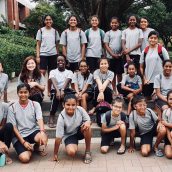
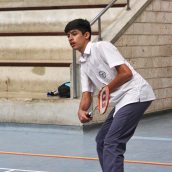
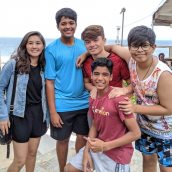
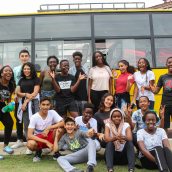
Join our students on their exhange journey by taking a look at our first photo gallery.
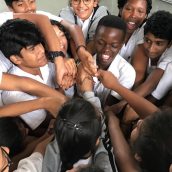
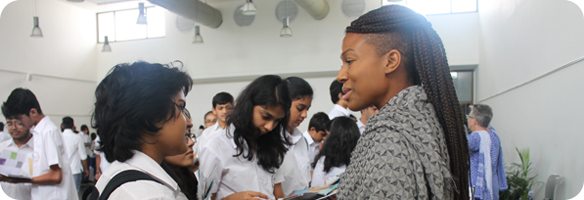
University Counselling
The Aga Khan Academy Hyderabad’s university counselling programme offers students a vast array of resources designed to help them find good matches between themselves and universities or colleges. These resources include a dynamic and well-resourced university counsellor, a wealth of printed, video and online tools, and a series of informational workshops and seminars on topics central to the university discovery process. Each year, we host university fairs at the Academy which are attended by universities from around the world, giving our students exposure to a wealth of options from which to choose.
Our counsellor engages students in individual conferences that are designed to help students reach a greater awareness of who they are. Armed with the well-articulated sense of self, students are prepared to find universities or colleges that are the best fit. Ours is a student-centred approach, and we believe that the likelihood of satisfaction with their choices is enhanced when students are empowered to 'own' the process. Also key to success is good communication among all parties: students, parents and university counsellors. While outcomes are important, it is the process of self-discovery and university-discovery on which our programme focuses.
For more information, please write to our University Counsellor, Pragati Pandey, reachable at pragati.pandey@agakhanacademies.org.
Click here to view the 2023-2024 school profile.
Click here to download a copy of the 2023-2024 University Counselling Handbook.

Primary Years Programme
The Aga Khan Academy Dhaka is an International Baccalaureate World School and has been authorised for the Primary Years Programme (PYP).
Foundations for lifelong learning
Our PYP curriculum for students in Grades 1-5 (aged 6-11) focuses on the development of the whole child. It is geared towards creating independent, confident and respectful learners.
Our classroom curriculum addresses the children's social, physical, cultural and ethical development while giving them a strong foundation in all the major areas of knowledge.
The curriculum consists of five essential elements:
- Concepts;
- Knowledge;
- Skills;
- Attitude; and
- Action.
 The core subjects we cover include English language, Bangla, mathematics, social studies, science and technology. Our programme also includes physical education, music and art. The use of Informational technology (IT) is integrated throughout the curriculum.
The core subjects we cover include English language, Bangla, mathematics, social studies, science and technology. Our programme also includes physical education, music and art. The use of Informational technology (IT) is integrated throughout the curriculum.
Students and teachers explore questions in all subject areas using an interactive, student-centred approach. This triggers students' curiosity, encouraging them to make connections with real-world issues. Students become active, autonomous learners who can take action as a result of their learning.
Our curriculum develops well-rounded students who are well-versed in all areas of knowledge. They learn to be intellectually curious, principled, caring, open-minded, well-balanced and reflective learners.
Please visit the Admission Requirements page to find out more about applying to Grades 1-5 at the Academy.
